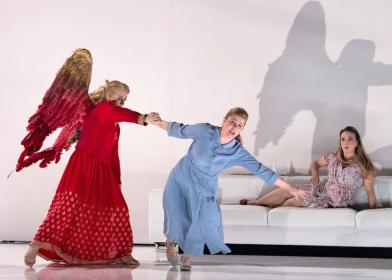Opera reviews, news and interviews
Orpheus and Eurydice, Opera Queensland/SCO, Edinburgh International Festival 2025 review - dazzling, but distracting
Thursday, 14 August 2025
There’s a lot to shout about in this Orpheus, especially the way it looks. In a thin year for staged opera at the Edinburgh International Festival, they’ve gone for an eye-popper with this staging of Gluck’s most influential work. Premiering at Australia’s Opera Queensland in 2019, its star attraction is the Brisbane-based Circa Ensemble, a group of acrobats, circus artists and physical performers whose antics light up the stage.
MARS, Irish National Opera review - silly space oddity with fun stretches
Monday, 11 August 2025
The craft heads to Mars, the music remains below on earth. Which is partly intentional: composer Jennifer Walshe tells us she listened to “synth heavy music” uploaded by astronauts (“a lot of Mike Oldfield and Vangelis”), so we veer from pop to sound-effects, some good (the sparkler held close to a microphone), some ordinary (a chain thrown to the ground sounds exactly like that). It’s a well-executed whole, though, and will be a hit whatever I write about it.
Subscribe to theartsdesk.com
Thank you for continuing to read our work on theartsdesk.com. For unlimited access to every article in its entirety, including our archive of more than 15,000 pieces, we're asking for £5 per month or £40 per year. We feel it's a very good deal, and hope you do too.
To take a subscription now simply click here.
And if you're looking for that extra gift for a friend or family member, why not treat them to a theartsdesk.com gift subscription?
Footnote: a brief history of opera in Britain
Britain has world-class opera companies in the Royal Opera, English National Opera, Welsh National Opera, Scottish Opera and Opera North, not to mention the celebrated country-house festival at Glyndebourne and others elsewhere. The first English opera was an experiment in 1656, as Civil War raged between Cromwell and Charles II, and it was under the restored king that theatre and opera exploded in London. Henry Purcell composed the masterpiece Dido and Aeneas (for a girls' school) and over the next century Handel, Gluck, J C Bach and Haydn came to London to compose Italian-style classical operas.
Hogarth_Beggars_Opera_1731_cTateHowever, the imported style was challenged by the startling success of John Gay's low-life street opera The Beggar's Opera (1728), a score collating 69 folk ballads, which set off a wave of indigenous popular musical theatre (pictured, William Hogarth's The Beggar's Opera, 1731, © Tate). Gay built the first Covent Garden opera house (1732), where three of Handel's operas were premiered, and musical theatre and vaudeville flourished as an alternative to opera. Through the 19th century, London became a hub for visiting composers and grand opera stars, but from the meshing of "high" and "popular" creativity at Sadler's Wells (built in 1765) evolved in time a distinct English tradition of wit and social satire in the "Savoy" operas of Gilbert and Sullivan.
In the 20th century Benjamin Britten's dramatic operas such as Peter Grimes and Billy Budd reflected a different sort of ordinariness, his genius driving the formation of the English Opera Group at Aldeburgh. English opera, and opera in English, became central to the establishment, after the Second World War, of a national arts infrastructure, with subsidised resident companies at English National Opera and the Royal Opera. By the 1950s, due to pressure from international opera stars refusing to learn roles in English, Covent Garden joined the circuit of major international houses, staging opera in their original languages, with visiting stars such as Maria Callas, Tito Gobbi and the young Luciano Pavarotti matched by home-grown ones like Joan Sutherland and Geraint Evans.
Today British opera thrives with a reputation for fresh thinking in classics, from new productions of Mozart, Verdi and Wagner landmarks to new opera commissions and popular arena stagings of Carmen. The Arts Desk brings you the fastest overnight reviews and the quickest ticket booking links for last night's openings, as well as the most thoughtful close-up interviews with major creative figures and performers. Our critics include Igor Toronyi-Lalic, David Nice, Edward Seckerson, Alexandra Coghlan, Graham Rickson and Ismene Brown.
The future of Arts Journalism
You can stop theartsdesk.com closing!
We urgently need financing to survive. Our fundraising drive has thus far raised £49,000 but we need to reach £100,000 or we will be forced to close. Please contribute here: https://gofund.me/c3f6033d
And if you can forward this information to anyone who might assist, we’d be grateful.

latest in today
 'We are bowled over!' Thank you for your messages...
'We are bowled over!' Thank you for your messages...















































